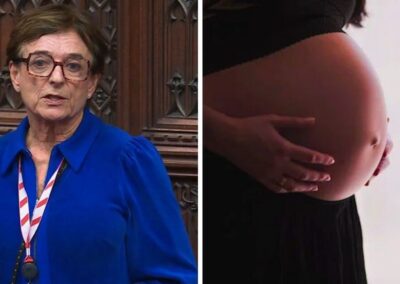France’s National Assembly has voted in favour of an extreme Bill that could introduce abortion on demand, right up to the point of birth, to the country.
Legislators approved the Bioéthique Bill by 60 votes to 37.
Just hours before the vote, a radical last minute amendment to the legislation was adopted which permits abortion up to birth for “psychosocial distress”.
‘Unverifiable criterion’
Alliance Vita, a French pro-life group, has expressed concern that the proposed law “blows up the [current] abortion framework” as “psychosocial distress” is an “unverifiable criterion” which will allow an abortion until the last day of pregnancy.
The pro-life group’s founder, Tugdual Derville, commented on Twitter: “Those who know that it has NEVER been possible to verify distress, that was the former motive for voluntary abortion, will understand where the trap lies.”
Similar wording in legislation that was introduced to the Australian state of Victoria in 2008 has allowed for abortion on demand, for any reason, right through to birth.
The law in Victoria allows for abortion right through to birth on physical, psychological and social grounds when approved by two doctors; this can be the abortion operating surgeon and anaesthetist. This has, in practice, allowed for abortion on demand, for any reason.
Ahead of the legislation being introduced in Victoria in 2008, abortion activists claimed that, although abortion would, in practice, be allowed for any reason, doctors would ensure that the vast majority of abortions would only occur in rare circumstances – for example, when a baby had a condition where they would either die in the womb or shortly after birth.
Data from the 12 years of the law being in operation in Victoria shows that this has not been the case. Right To Life UK’s Public Affairs team have undertaken an extensive analysis of published abortion data on late-term abortions in Victoria from The Consultative Council on Obstetric and Paediatric Mortality.
This data shows that since the law changed in 2008, 1,418 late-term abortions (between 20-weeks’ gestation and birth) have been performed, allowed by doctors for ‘psychosocial’ reasons – these were terminations where the baby did not have a disability and the abortion was performed on social grounds. In 2011, one of these abortions on social grounds occured at 37 weeks.
Another side effect of the very high late-term abortion numbers in Victoria is that scores of babies have been left to die after being born alive during a number of ‘botched’ terminations.
The Victorian Consultative Council on Obstetric and Paediatric Mortality and Morbidity reported that in 2012 there were 53 ‘terminations of pregnancy’ after 20 weeks ‘resulting in live birth’.
By contrast, a 2008 report for England and Wales found that 66 infants were born alive after NHS terminations in one year. While these figures are comparable in number, Victoria’s population of 6.36 million is just a tenth of the size of the population in England and Wales.
‘Manipulation’
Alliance Vita has also condemned the timing of the vote, which took place in the middle of the night without a prior announcement or impact study, branding it “manipulation”.
As a result of the timing, only 101 National Assembly members voted on the controversial Bill out of a total of 577.
Additionally, they objected to the lack of time taken to assess the consequences and impact of the Bill. One of the Bill’s main opponents, Emmanuelle Ménard, was unable to speak out against the legislation and its amendments during its Second Reading.
Next stages
The Bill will now return to France’s Senate for a Second Reading, where it may be further amended, before facing a vote by a joint committee of the two houses later this year. However, the National Assembly’s decision is final when a consensus cannot be reached.
Currently, around 220,000 abortions take place in France every year. Campaigners fear that number could increase if the extreme legislation becomes law.
Another adopted amendment removed language recognising the humanity of an unborn baby by substituting the words “unborn child or children” with “embryos or foetuses”.












